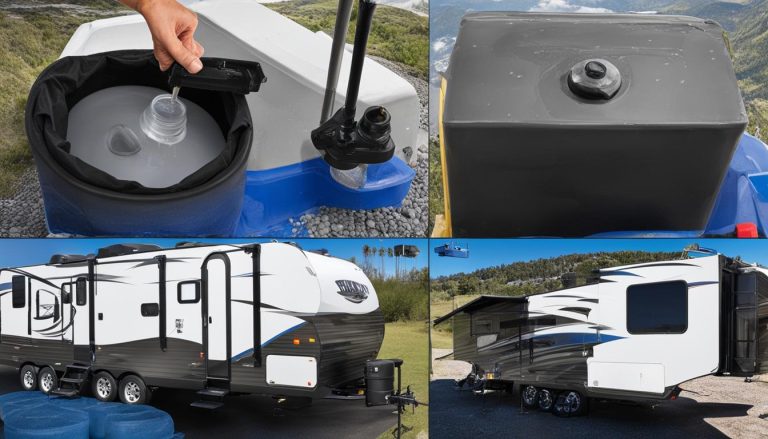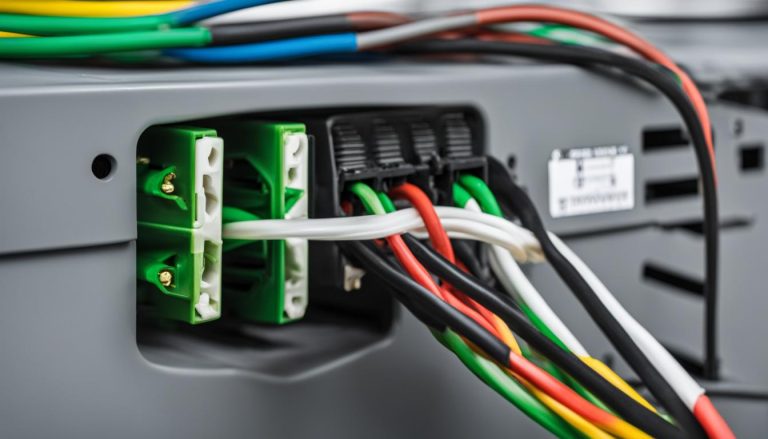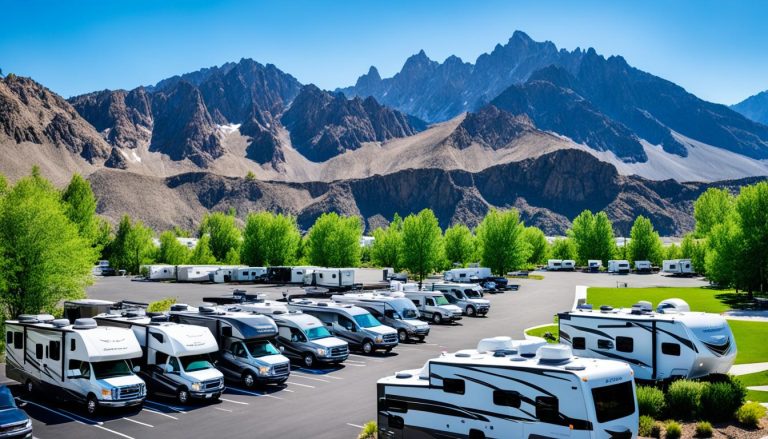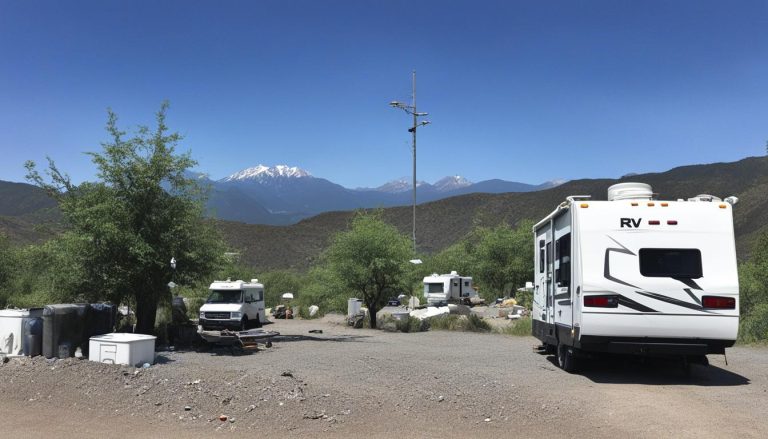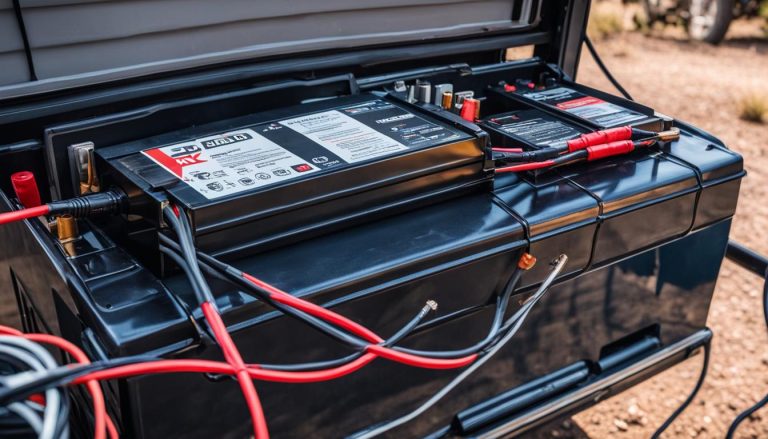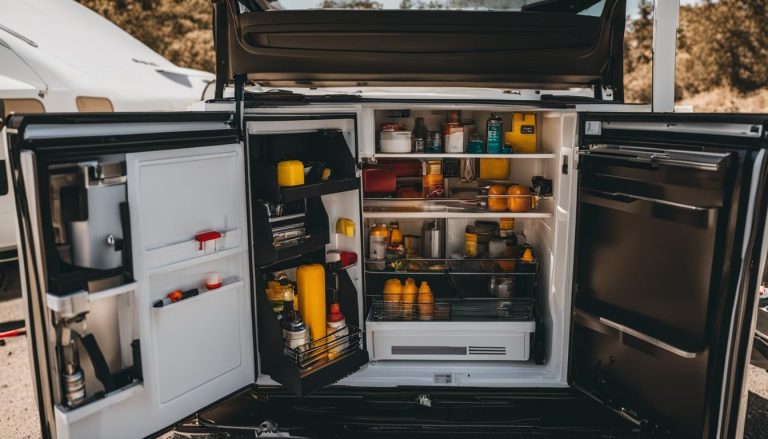Experience the Freedom of Boondocking RV Living
gorvlifestyle.com and its partners may earn a commission if you purchase a product through one of our links
Have you ever dreamt of escaping the bustling city life and immersing yourself in the tranquility of nature? Boondocking RV living offers the perfect opportunity to disconnect from the crowds and experience the freedom of camping off-the-grid.
Boondocking, also known as dry camping or wild camping, allows you to camp in remote locations, away from traditional campgrounds and amenities. It’s a chance to embrace the beauty of undisturbed landscapes and revel in the serenity of nature.
But what exactly is boondocking and how can you make the most of this unique camping experience? In this article, we’ll explore the meaning of boondocking, provide essential tips for successful boondocking, and highlight the benefits of embracing the boondocking lifestyle.
Key Takeaways:
- Boondocking RV camping offers the freedom to camp off-the-grid.
- Boondocking, also known as dry camping or wild camping, involves camping in remote locations without traditional amenities.
- Essential tips and preparation can ensure a successful boondocking experience.
- Boondocking allows for cost savings, seclusion, and a closer connection to nature.
- Embracing the boondocking lifestyle involves finding suitable locations and making upgrades to enhance self-sufficiency.
The Challenges of Early Boondocking Experiences
In the early stages of boondocking, you may encounter a few challenges and limitations. Without the convenience of electrical hookups and amenities, managing power and water consumption can be tricky. The limited resources available may result in running out of power and water, especially if you’re camping with multiple people in an RV. Additionally, finding dump stations to empty waste tanks and refill water tanks can add to the logistical challenges of boondocking. To keep the lights on and water flowing, many boondockers rely on generators, which can be noisy and inconvenient.
Running out of power in the middle of nowhere or discovering a full waste tank can be stressful, but these challenges are part of the learning experience. By proactively managing your resources and making necessary adjustments, you can overcome the initial hurdles and fully embrace the boondocking lifestyle.
One of the limitations of dry camping is the dependence on generators to power your RV’s electrical systems. While generators provide a temporary solution, the reliance on them can disrupt the serenity of your boondocking experience. To minimize this reliance, you may consider alternative power sources such as solar panels and increasing your battery capacity. These upgrades can provide a more sustainable and eco-friendly solution while allowing you to enjoy the peace and quiet of nature.
With careful planning and preparation, the challenges of early boondocking experiences can be overcome. Investing in the right equipment and adopting sustainable practices will enable you to enjoy the freedom and serenity of off-grid camping without sacrificing comfort.
| Challenges | Solutions |
|---|---|
| Running out of power | Upgrade battery capacity Install solar panels |
| Running out of water | Conservation strategies Water management techniques |
| Waste tank management | Plan for dump stations Monitor tank levels |
| Reliance on generators | Invest in alternative power sources Use generators sparingly |
Enhancing the Boondocking Experience with Upgrades
To fully embrace the boondocking lifestyle and overcome the challenges faced in the early stages, upgrading your RV can make a world of difference. By making strategic improvements, you can significantly enhance your boondocking experience, increasing self-sufficiency and reducing reliance on generators.
1. Increasing Battery Capacity
One of the key upgrades for boondocking is increasing your RV’s battery capacity. By upgrading to high-capacity deep cycle batteries, you can power your appliances and devices for longer periods without needing to recharge. This means more time enjoying the freedom of boondocking and less time worrying about running out of power.
2. Installing Solar Panels
Harness the power of the sun by installing solar panels on your RV. Solar panels provide a renewable and environmentally friendly energy source, allowing you to generate electricity while off-the-grid. With solar panels, you can recharge your batteries and power your appliances without relying solely on generators or external power sources.
3. Using LED Lights
LED lights are an energy-efficient solution to illuminate your RV while conserving battery power. By replacing traditional incandescent bulbs with LED lights, you can significantly reduce power consumption and increase the longevity of your batteries. LED lights are also known for their brightness and durability, making them perfect for boondocking adventures.
4. Improving Self-Sufficiency
Upgrading your RV for boondocking goes beyond power sources and lighting. Consider enhancements that promote self-sufficiency, such as installing a composting toilet or a water filtration system. These upgrades reduce the need for external amenities, allowing you to be more independent and reducing the reliance on traditional campground facilities.
5. Reducing Reliance on Generators
While generators can provide reliable power, they can also be noisy and consume fuel. By implementing the above upgrades, you can significantly reduce your reliance on generators, allowing for a quieter and more sustainable boondocking experience. With the right upgrades, you can enjoy the peace and tranquility of nature without the constant hum of a generator in the background.
| Upgrades | Benefits |
|---|---|
| Increased battery capacity | – Longer periods without needing to recharge – Power for appliances and devices – Extended boondocking adventures |
| Solar panels | – Renewable source of energy – Reduced reliance on generators – Environmentally friendly power solution |
| LED lights | – Energy-efficient lighting solution – Minimized power consumption – Bright and durable lighting |
| Self-sufficiency upgrades | – Less reliance on external amenities – Increased independence – Enhanced boondocking experience |
| Reduced reliance on generators | – Quieter boondocking experience – Sustainable power solutions – Decreased fuel consumption |
By upgrading your RV for boondocking, you can enjoy the freedom, seclusion, and self-sufficiency that this unique camping experience offers. Whether it’s increasing battery capacity, installing solar panels, using LED lights, or embracing other upgrades, enhancing your RV will ensure a more comfortable and enjoyable boondocking adventure.
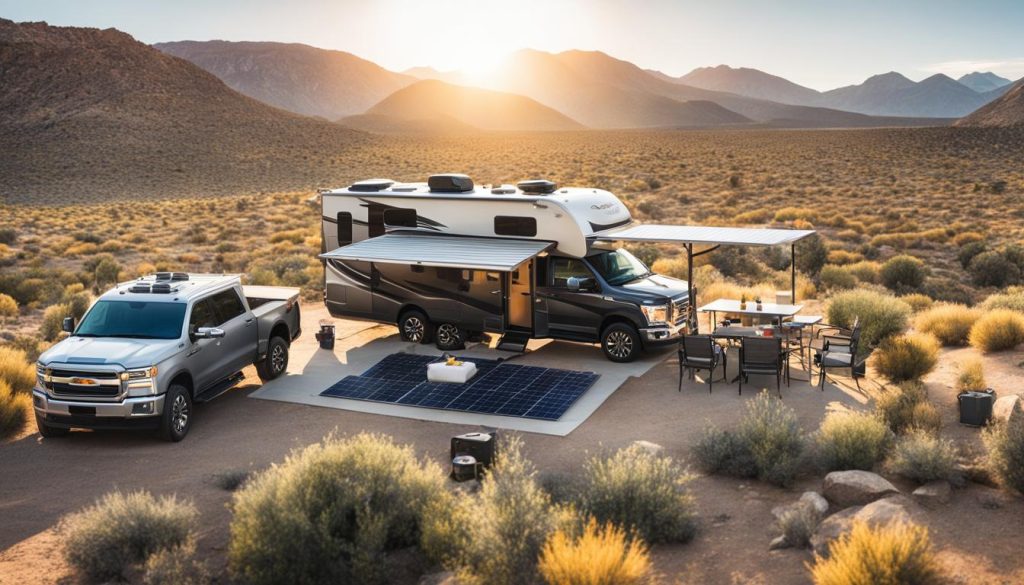
Essential Equipment for Boondocking in an RV
When you’re preparing for a boondocking adventure, having the right equipment is essential to ensure a smooth and enjoyable experience. Here are some must-have supplies and gear to consider:
1. Stocking up on Groceries and Toiletries
Since boondocking spots are often located far from civilization, it’s important to stock up on groceries and toiletries before hitting the road. Make a list of essential items and ensure you have an ample supply to last throughout your trip.
2. Carrying Flashlights and Batteries
As you’ll be camping off-the-grid, having reliable lighting is crucial. Pack flashlights and extra batteries to keep your campsite well-lit during the night. LED flashlights are a great choice for their long battery life.
3. Using Paper Maps
Although GPS and digital maps are convenient, they may not work in remote areas with no cell service. Carrying paper maps is essential to ensure you don’t get lost and can navigate your way even without internet access.
4. Maintaining RV Batteries
Your RV’s batteries are your lifeline for power when boondocking. Regularly check and maintain your RV’s batteries to ensure they’re in good condition. This includes keeping them charged and replacing them when necessary.
5. Fresh Water and Waste-Water Tanks Management
Managing your fresh water and waste-water tanks is crucial while boondocking. Monitor your water levels and plan accordingly to conserve water. Additionally, be mindful of dumping waste-water in designated stations to minimize environmental impact.
| Essential Supplies for Boondocking | Recommended Brands |
|---|---|
| Groceries | Trader Joe’s, Whole Foods |
| Toiletries | Dove, Colgate |
| Flashlights | Maglite, Energizer |
| Batteries | Duracell, Panasonic |
| Paper Maps | National Geographic, Rand McNally |
Remember, boondocking allows you to experience the freedom of camping in remote locations, but being well-prepared is key to enjoying the experience to its fullest. With the right equipment and supplies, you’ll be ready to embark on an unforgettable adventure in the great outdoors.
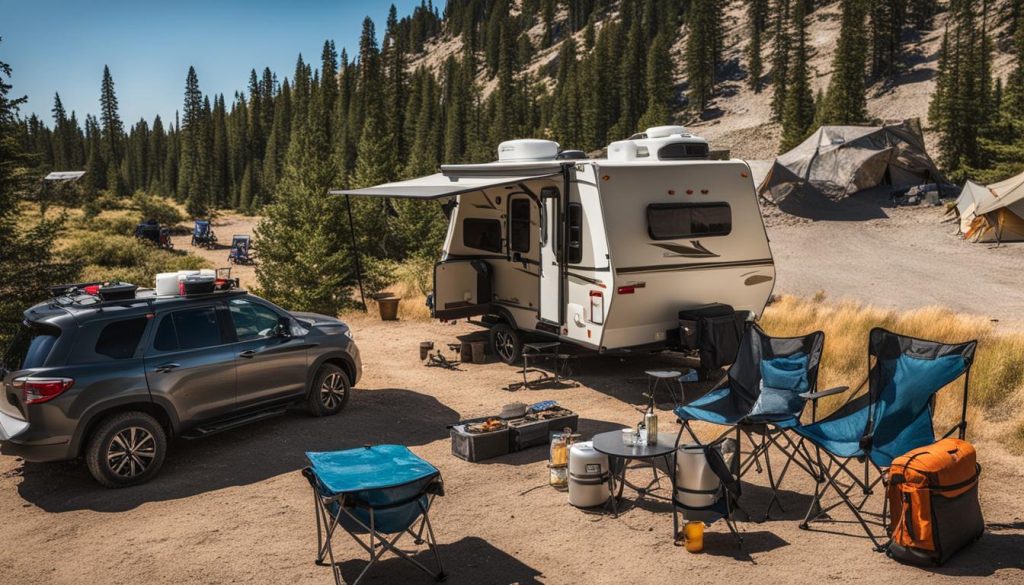
Tips for a Successful Boondocking Experience
Make the most of your boondocking adventure with these helpful tips and strategies. By following these suggestions, you’ll ensure a fulfilling and enjoyable experience:
Avoiding Monotony
Embrace the changing scenery and weather to keep things interesting. Each location offers its own unique beauty and charm. Take the time to appreciate the small details and immerse yourself in the natural surroundings. Whether it’s a stunning sunset or a tranquil forest, finding beauty in each boondocking spot helps combat monotony.
Planning Travel
Plan your travels to discover new boondocking destinations. Research different areas, gather information about local attractions, and create an itinerary that excites you. The thrill of exploring new places adds a sense of adventure and anticipation to your boondocking experience.
Learning Something New
Expand your horizons by learning something new during your boondocking trips. Take advantage of online courses, ebooks, or even engage in hobbies that interest you. Embracing the opportunity to broaden your knowledge and skills will provide mental stimulation and make your boondocking experience even more rewarding.
Staying Active
Boondocking is the perfect opportunity to stay active and connect with nature. Take advantage of the outdoor settings by going for hikes, bike rides, or engaging in other outdoor activities. Not only does this promote physical health, but it also contributes to your overall well-being and reduces stress.
Spending Time Outdoors
Immerse yourself in the natural beauty that surrounds your boondocking spot. Whether it’s reading a book under a shady tree or simply enjoying a cup of coffee while taking in the scenic views, spending time outdoors allows you to appreciate the tranquility and serenity of your surroundings.
Socializing
Connect with other RVers either online or in-person to combat feelings of isolation. Join boondocking communities, RV forums, or social media groups to meet like-minded individuals and share your experiences. Building a network of fellow boondockers will enhance your boondocking journey and provide a sense of camaraderie.
Creating a Dedicated Workspace
If you’re working remotely during your boondocking adventure, it’s essential to create a dedicated workspace. This helps separate work from leisure, promoting a healthy work-life balance. Set up a comfortable and functional workspace in your RV, allowing you to focus and be productive while enjoying the freedom of boondocking.
Focusing on the Positive
Lastly, focus on the positive aspects of boondocking and appreciate the freedom it provides. Embrace the simplicity and tranquility of living off-the-grid, and relish in the unique experiences it offers. Prioritize gratitude and cultivate a positive mindset to truly enjoy and make the most of your boondocking experience.
Follow these tips and strategies to ensure a successful and fulfilling boondocking experience. By avoiding monotony, planning exciting travels, learning new things, staying active, spending time outdoors, socializing, creating a dedicated workspace, and focusing on the positive, you’ll maximize the joy and freedom that boondocking has to offer.
Finding Boondocking Locations and Embracing the Boonies
One of the most exciting aspects of boondocking RV living is the opportunity to camp in unique and secluded locations. If you’re wondering how to find the perfect boondocking spot, there are several avenues you can explore.
BLM-managed public land and National Forests are popular choices among boondockers. These areas often have designated dispersed camping sites where you can park your RV and enjoy the beauty of nature. Additionally, certain Walmart parking lots and truck stops/rest areas allow overnight parking with permission, providing a convenient and safe option for boondocking. Visitor centers are also worth considering, as they sometimes offer nearby camping areas where you can immerse yourself in the natural surroundings.
Aside from the thrill of discovering hidden gems, boondocking offers a multitude of benefits. By embracing the freedom and seclusion that boondocking provides, you can disconnect from the noise and stress of everyday life. Imagine waking up to the sound of birds chirping, surrounded by breathtaking landscapes and starry nights. Boondocking allows you to fully embrace nature’s beauty and create unforgettable memories. So, get off the beaten path, find your piece of paradise, and experience the true essence of RV boondocking.
FAQ
What is boondocking RV?
Boondocking RV, also known as dry camping or wild camping, is a form of RV camping that allows individuals to camp off-the-grid, away from traditional campgrounds and amenities.
What are the benefits of boondocking?
Boondocking offers various benefits, including cost savings, seclusion, scenic views, and a closer connection to nature.
What are the challenges of early boondocking experiences?
The lack of electrical hookups and amenities can lead to difficulties in managing power and water consumption, as well as the need to find dump stations and rely on generators for power.
How can I enhance the boondocking experience with upgrades?
Upgrading RVs by increasing battery capacity, installing solar panels, and using LED lights can improve self-sufficiency and reduce reliance on generators.
What essential equipment do I need for boondocking in an RV?
Essential supplies include groceries, toiletries, flashlights, batteries, paper maps, and maintaining RV batteries, fresh water, and waste-water tanks.
What are some tips for a successful boondocking experience?
Tips include avoiding monotony, planning travel, learning something new, staying active, spending time outdoors, socializing, creating a dedicated workspace, and focusing on the positive aspects of boondocking.
How can I find boondocking locations?
Boondocking spots can be found in BLM-managed public land, National Forests, Walmart parking lots (with permission), truck stops/rest areas, and visitor centers, allowing for seclusion and a deeper connection with nature.

